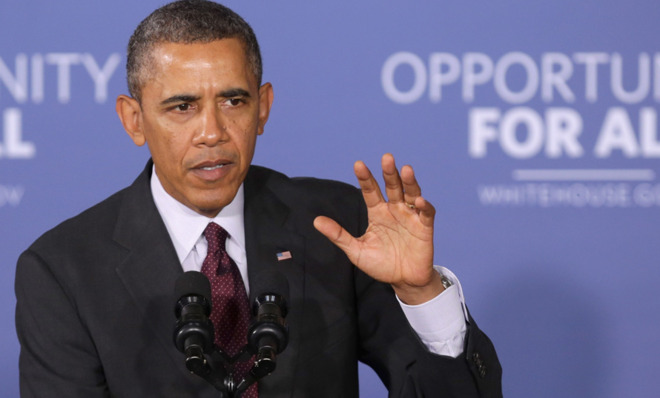If Obama is such a socialist, then why are government jobs disappearing?
Debunking the myth of the exploding government


A free daily email with the biggest news stories of the day – and the best features from TheWeek.com
You are now subscribed
Your newsletter sign-up was successful
The economy has added roughly 8.5 million jobs in the past four years, per Friday's Bureau of Labor Statistics report. Yet while the labor market has turned around since the Great Recession, one sector has consistently, conspicuously gone in the other direction: public employment.
Yes, for all the talk on the right about how President Obama is a closet socialist bent on ballooning the government, jobs at the state, local, and federal levels have steadily dried up since Obama took office. Even with a significant spike of temporary Census employees in 2010 — an unavoidable decennial blip — public sector employment has fallen nearly 3.5 percent since 2009. The graph below charts the change in public sector jobs, indexed to 100, since Obama's inauguration.
Meanwhile, the private sector has steadily added jobs. Though private sector employment increased by 142,000 jobs in January, public sector employment at all levels of government fell by 29,000. All of which underscores an undeniable trend during Obama's presidency of private sector job growth — shown by the red line below — and public sector job shrinkage.
The Week
Escape your echo chamber. Get the facts behind the news, plus analysis from multiple perspectives.

Sign up for The Week's Free Newsletters
From our morning news briefing to a weekly Good News Newsletter, get the best of The Week delivered directly to your inbox.
From our morning news briefing to a weekly Good News Newsletter, get the best of The Week delivered directly to your inbox.
It's not just Obama, though. Public sector employment dropped during the 1990s, when President Clinton declared the "era of big government" over. And though it ticked back up under President George W. Bush, it's once again on the decline.
The decline under Obama — coming after a recession, and coinciding with an ill-timed push from the right to cut spending and attack the deficit — is particularly notable for its severity. As Mother Jones' Kevin Drum wrote, "This is the price of austerity."
"If public sector employment had been growing normally during this period, we'd have about a million more jobs than we do now and the unemployment rate would probably be below 6 percent," he added. "We are our own worst enemies."
So what gives? Why has the "Obama is a socialist" meme endured so long?
A free daily email with the biggest news stories of the day – and the best features from TheWeek.com
Probably because it fits the convenient, facts-be-damned narrative on the right of government run amok.
Consider that federal spending under Obama is actually slow, relative to other recent presidents. And since 2009, the deficit has fallen by more than half as a percentage of the economy. Still, less than a third of Americans realize the deficit is going down. As The Week's John Aziz noted, that's partly because "economists, politicians, and pundits are failing to communicate the facts to the public, or deliberately misleading voters."
"It is easy for reality to get lost in spin and manufactured narratives," he added.
I'd wager a similar dynamic is at play here, with people conflating Obama's progressive rhetoric and policies, or his vow to circumvent a truculent Congress, with government bloat and overreach.
Indeed, a 2010 survey found that 55 percent of likely voters thought Obama was, to some degree, a socialist.
But the narrative is bunk. The government is getting smaller under Obama, and there's no sign that will change any time soon.
Jon Terbush is an associate editor at TheWeek.com covering politics, sports, and other things he finds interesting. He has previously written for Talking Points Memo, Raw Story, and Business Insider.
